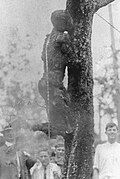The lynching of Jesse Washington, a teenage African-American farmhand, in Waco, Texas, in 1916 became a well-known example of racially motivated lynching. After being accused of raping and murdering his employer's wife, he entered a guilty plea and was quickly sentenced to death. After his sentence was pronounced, he was dragged out of the court by observers and lynched in front of Waco's city hall. Over 10,000 spectators, including city officials and police, gathered to watch the attack. Members of the mob castrated Washington, cut off his fingers, and hung him over a bonfire. A professional photographer took pictures as the event unfolded, providing rare imagery of a lynching in progress. The National Association for the Advancement of Colored People investigated the event and subsequently featured Washington's death in their anti-lynching campaign. Historians have noted that Washington's death helped alter the way that lynching was viewed; the publicity it received curbed public support for the practice, which became viewed as barbarism rather than an acceptable form of justice. (more...)
Recently featured: Osiris myth – White Stork – Mary Martha Sherwood
